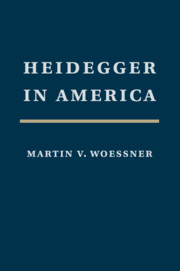Book contents
- Frontmatter
- Contents
- Preface
- Introduction: Being Here
- 1 Freiburg Bound
- 2 Exiles and Emissaries
- 3 Nihilism, Nothingness, and God
- 4 An Officer and a Philosopher
- 5 Dasein and das Man
- 6 The Continental Divide
- 7 Richard Rorty and the Riddle of the Book that Never Was
- 8 Ethics, Technology, and Memory
- 9 Culture Wars
- Conclusion: Being There
- Index
- References
3 - Nihilism, Nothingness, and God
Heidegger and American Theology
Published online by Cambridge University Press: 04 February 2011
- Frontmatter
- Contents
- Preface
- Introduction: Being Here
- 1 Freiburg Bound
- 2 Exiles and Emissaries
- 3 Nihilism, Nothingness, and God
- 4 An Officer and a Philosopher
- 5 Dasein and das Man
- 6 The Continental Divide
- 7 Richard Rorty and the Riddle of the Book that Never Was
- 8 Ethics, Technology, and Memory
- 9 Culture Wars
- Conclusion: Being There
- Index
- References
Summary
Yes, by existence, Heidegger meant the search for God. He was a seeker of God his entire life.
Hans-Georg Gadamer“Good Country People,” is a classic Flannery O'Connor story. In it, all the ingredients of her peculiarly gothic style are present, from the regional locale and curious characters to the comic shock of the grotesque, coiled and ever-ready to spring upon the unsuspecting reader. At the beginning of the story, we are introduced to Mrs. Hopewell and her daughter Joy, who own some rural farmland on which one Mrs. Freeman and her family also live as renters. Mrs. Hopewell is happy to have found in the Freemans a solid family of “good country people” upon whom she can depend. They may not be the smartest folks around, but they “are the salt of the earth,” and Mrs. Hopewell stands by them. Her daughter, Joy, however, does not share this opinion.
Joy Hopewell is a happy-sounding name, of course, but for a thirty-two-year old woman with a fatal health condition, someone who, in addition, has to wear a prosthetic leg because when she was ten her leg “had been shot off in a hunting accident,” such a name may just as well be the proverbial insult upon the injury. But Joy, in an act of existential self-creation, had deliberately overcome the burden of such an obscenely cheery name: she had renamed herself Hulga, “the ugliest name in any language.” This act of self-naming was not the only source of her strength.
- Type
- Chapter
- Information
- Heidegger in America , pp. 92 - 131Publisher: Cambridge University PressPrint publication year: 2010

